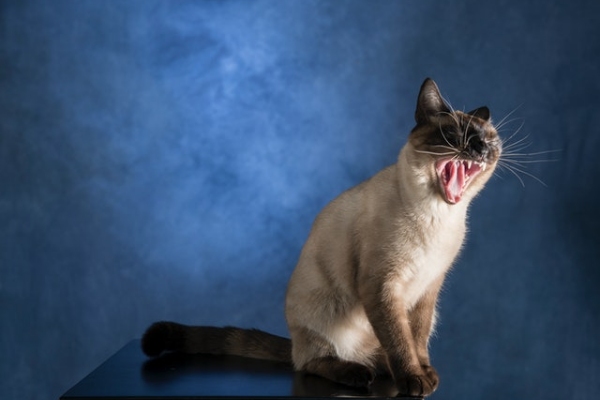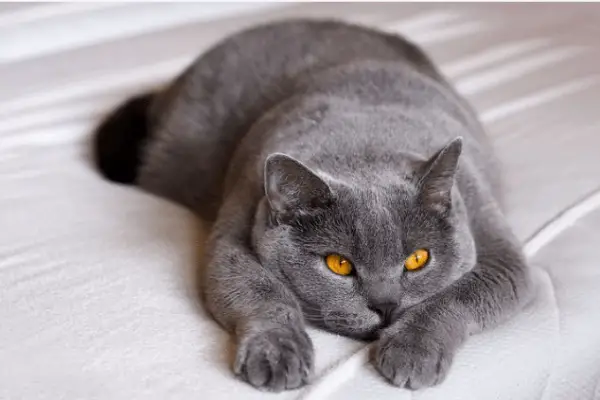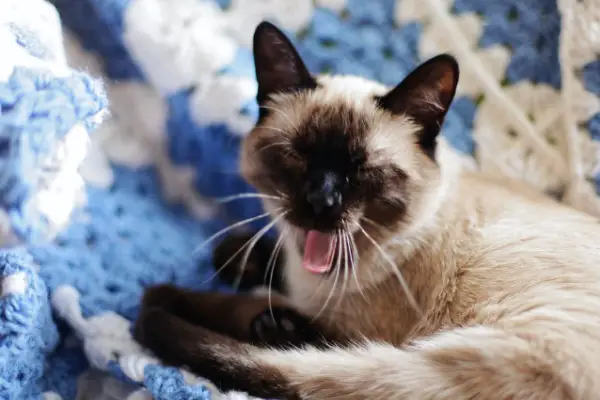Why Does My Cat Smell So Bad [12 Potential Reasons]
![Why Does My Cat Smell So Bad [12 Potential Reasons] Why Does My Cat Smell So Bad](https://petcreeks.com/wp-content/uploads/2023/10/cat-3054260_640.jpg)
Have you ever wondered why your adorable feline friend sometimes emits an unpleasant odor? Well, you’re not alone.
In this blog post, we’ll uncover the reasons behind that mysterious stench and provide you with some simple solutions to keep your kitty smelling fresh and clean.
So, let’s dive in and stop that funky smell for good!
Why Does My Cat Smell So Bad
Your cat is smelling so bad due to bad breath, dental issues, skin infections, digestive issues, problems with their anal glands, poor hygiene, or lack of proper grooming.
Regular grooming, dental care, and a vet checkup can help address these issues and keep your cat smelling fresh.
Let’s dive deeper…
Reasons Why Your Cat Might Be Smelling Bad
Here are some of the most common reasons why your cat is smelling so bad:
1. Unclean Litter Box Issues
One possible reason why your cat might smell bad is if the litter box is not being cleaned regularly. Cats are naturally clean animals and prefer to use a clean litter box.
If the litter box is dirty or has a strong odor, your cat may avoid using it, leading to accidents outside the box and a buildup of waste that can cause a foul smell.
To fix this issue, make sure to clean the litter box daily, removing any waste and replacing the litter as needed. This will help keep the litter box clean and odor-free, encouraging your cat to use it consistently.
2. Lack of Proper Grooming
Another reason why your cat might be smelling bad is if they are not grooming themselves properly. Cats are known for their grooming habits and spend a significant amount of time cleaning themselves.
However, if your cat is unable to groom themselves due to obesity, arthritis, or other health issues, their fur may become dirty and matted, leading to a bad odor.
To fix this issue, you can help your cat with grooming by brushing their fur regularly and providing them with a clean and comfortable environment. If your cat is unable to groom themselves adequately, it’s important to consult with a veterinarian for further guidance.
3. Poor Oral Hygiene
Poor oral hygiene can also contribute to a bad smell in cats. Dental issues such as gum disease, tooth decay, or infections can cause bad breath and an unpleasant odor.
If your cat’s breath smells bad or you notice any signs of dental problems, it’s important to have their teeth and gums checked by a veterinarian.
Regular dental care, including brushing your cat’s teeth and providing dental treats or toys, can help maintain good oral hygiene and prevent dental issues.
4. Ear Infections
Ear infections can also be a cause of bad odor in cats. If your cat’s ears have a foul smell or discharge, or they are constantly scratching or shaking their head, it may indicate an ear infection.
Ear infections can be caused by bacteria, yeast, or parasites and require veterinary treatment.
Your veterinarian can examine your cat’s ears, prescribe appropriate medication, and provide guidance on how to clean and care for your cat’s ears to prevent future infections.
5. Poor Diet
A poor diet can contribute to a bad smell in cats. If a cat is not receiving proper nutrition, it can lead to digestive issues and an imbalance in the gut flora, which can result in foul-smelling stools and bad breath.
To fix this issue, it is important to provide a balanced and nutritious diet for your cat.
Consult with a veterinarian to ensure that your cat is receiving the appropriate nutrients and consider switching to a high-quality cat food that meets their dietary needs.
6. Poor Hygiene
Poor hygiene can also cause a cat to smell bad. Cats are generally clean animals and groom themselves regularly.
However, if a cat is unable to groom properly due to obesity, arthritis, or other health issues, it can lead to a buildup of dirt, oils, and bacteria on their fur, resulting in a bad odor.
To address this, you can help your cat with grooming by brushing their fur regularly and keeping their litter box clean.
If your cat is unable to groom themselves adequately, you may need to assist them with bathing or seek professional grooming services.
7. Urinary Tract Infections
Urinary tract infections (UTIs) can cause a strong and unpleasant odor in a cat’s urine. Other symptoms of UTIs may include frequent urination, straining to urinate, and blood in the urine.
If you suspect that your cat has a UTI, it is important to take them to a veterinarian for diagnosis and treatment.
The veterinarian may prescribe antibiotics to clear the infection and recommend dietary changes or increased water intake to prevent future UTIs.
8. Skin Infections
Skin infections can also contribute to a bad smell in cats. Bacterial or fungal infections can cause itching, redness, and a foul odor.
If you notice that your cat has skin lesions, hair loss, or an unpleasant smell, it is important to have them examined by a veterinarian.
The veterinarian may recommend topical or oral medications to treat the infection and address any underlying causes, such as allergies or parasites.
9. Anal Gland Problems
One possible reason why your cat might be smelling bad is due to anal gland problems. Cats have anal glands located on either side of their anus, which produce a strong-smelling fluid.
These glands are normally expressed when a cat defecates, but sometimes they can become impacted or infected, leading to a foul odor.
To fix this issue, it is best to consult with a veterinarian who can manually express the glands or provide appropriate treatment, such as antibiotics, if there is an infection.
10. Dirty Fur
Another reason for a bad smell in cats could be dirty fur. Cats are generally clean animals and groom themselves regularly, but sometimes they may not be able to keep their fur clean due to various reasons, such as obesity, arthritis, or dental problems.
This can result in a buildup of dirt, oils, and bacteria, leading to an unpleasant odor. To fix this issue, regular grooming is essential. Brushing your cat’s fur regularly can help remove dirt and distribute natural oils.
If your cat is unable to groom itself properly, you may need to assist by using cat-friendly wipes or giving them a bath using cat-specific shampoos.
11. Infected Wounds
Infected wounds can also cause a bad smell in cats. Cats can get wounds from fights with other animals or accidents.
If a wound becomes infected, it can produce a foul odor. It is important to keep an eye on any wounds your cat may have and seek veterinary attention if you notice signs of infection, such as redness, swelling, discharge, or a bad smell.
The veterinarian will clean the wound, prescribe antibiotics if necessary, and provide appropriate wound care instructions.
12. Digestive Issues
Digestive issues can contribute to a bad smell in cats. Cats with gastrointestinal problems, such as diarrhea or constipation, may have an unpleasant odor due to the abnormal digestion and fermentation of food in their intestines.
If your cat is experiencing digestive issues, it is important to consult with a veterinarian to determine the underlying cause and develop a treatment plan. This may involve dietary changes, medication, or other interventions to improve your cat’s digestive health.
How to Keep Your Cat Smelling Fresh
To keep your cat smelling fresh always, here are some common steps you can take:
1. Regular grooming: Regular grooming is essential to keep your cat smelling fresh. Brush your cat’s fur to remove loose hair and prevent matting. This will also help distribute natural oils and reduce odors.
2. Bathing: While cats are generally good at grooming themselves, occasional baths can help keep them smelling fresh. Use a cat-specific shampoo and follow proper bathing techniques to avoid stressing your cat.
3. Proper dental care: Bad breath can contribute to unpleasant odors. Establish a dental care routine for your cat, including regular brushing and dental treats or toys to promote oral hygiene.
4. Clean the litter box: Regularly clean the litter box to prevent odors from accumulating. Scoop waste daily and change the litter as needed. Consider using odor-absorbing litter or litter box deodorizers.
5. Proper diet: A balanced and high-quality diet can contribute to your cat’s overall health and reduce unpleasant odors. Consult with your veterinarian to ensure your cat is getting the right nutrients.
6. Provide Fresh water: Provide your cat with fresh water daily. Staying hydrated can help flush out toxins and reduce odors.
7. Regular veterinary check-ups: Regular veterinary check-ups are important to detect any underlying health issues that may contribute to unpleasant odors. Your veterinarian can provide guidance on maintaining your cat’s hygiene.
8. Clean bedding and toys: Wash your cat’s bedding and toys regularly to remove dirt, bacteria, and odors. Use pet-safe detergents and follow the care instructions.
9. Odor-neutralizing products: Use odor-neutralizing products specifically designed for cats, such as sprays or wipes, to freshen up your cat’s coat between baths.
10. Maintain a clean environment: Keep your home clean and free from pet odors. Vacuum regularly to remove cat hair and dander, and use pet-safe cleaners to eliminate odors from surfaces.
Frequently Asked Questions
Why does my cat smell so bad even though I bathe them regularly?
Cats have a natural scent that can sometimes be strong, especially in unneutered males. Additionally, over-bathing can strip their skin of natural oils, leading to an unpleasant odor. However, if the smell is unusual or accompanied by other symptoms, it’s best to consult a veterinarian.
How can I prevent my cat from smelling bad?
Regular grooming is essential for maintaining a pleasant scent in cats. Brushing their fur regularly helps remove dirt, debris, and excess oils. Additionally, keeping their litter box clean, providing a balanced diet, and checking for any underlying health issues can also help prevent bad odors.
What could be causing my cat’s foul breath?
Foul breath in cats can be a sign of dental problems, such as tooth decay or gum disease. Poor oral hygiene can also contribute to bad breath. Regular dental care, including brushing their teeth and routine check-ups with a veterinarian, can help address this issue.
Why does my cat’s urine have a strong odor?
Strong-smelling urine in cats is often a sign of a urinary tract infection or a dietary issue. It’s important to monitor your cat’s litter box habits and consult a veterinarian if you notice any changes in urination patterns or detect an unusually strong odor.
My cat’s ears emit a foul odor. What could be the cause?
A foul odor coming from your cat’s ears may indicate an ear infection. Ear infections can be caused by bacteria, yeast, or allergies. It’s crucial to seek veterinary attention to diagnose and treat the underlying cause of the odor.
Is it normal for my cat’s poop to smell bad?
While cat feces will have a distinct odor, an excessively strong or foul smell can indicate a problem. Factors like diet, digestive issues, or gastrointestinal infections can contribute to an unpleasant odor. If the smell persists or is accompanied by changes in stool consistency, it’s best to consult a veterinarian.
Conclusion
So, next time you find yourself asking, “Why does my cat smell so bad?” remember that there can be several reasons behind it.
From poor hygiene and dental issues to diet and medical conditions, it’s essential to address the root cause and provide the necessary care to keep your furry friend smelling fresh and clean.
So, don’t wait, take action, and give your cat the love and attention they deserves!

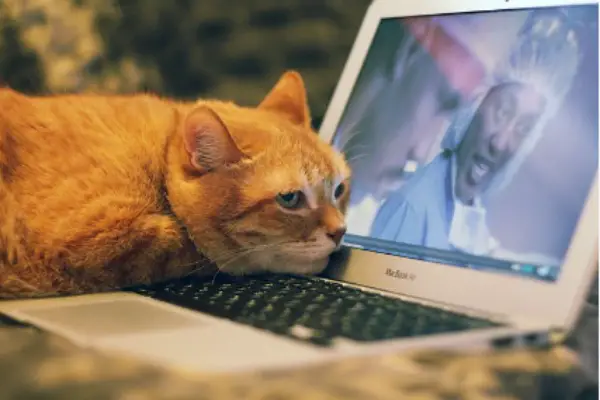
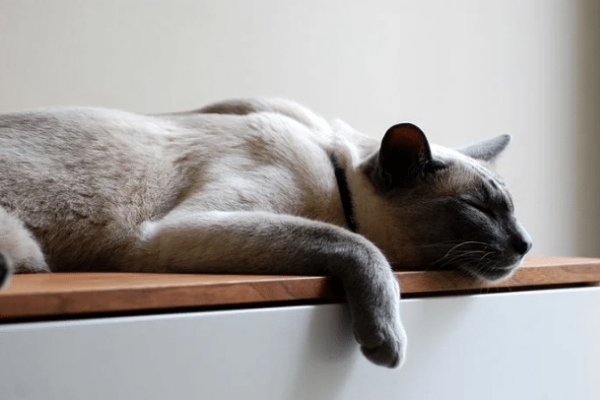
![How to Keep Outdoor Cats Warm in Winter [10 Hints] How to Keep Outdoor Cats Warm in Winter](https://petcreeks.com/wp-content/uploads/2023/10/pexels-aleksandr-nadyojin-7335655.jpg)
